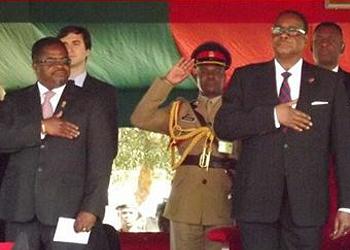
By Charles Mkoka
LILONGWE, Malawi, August 9, 2015 (ENS) – The harshest sentences ever handed down for wildlife crimes in Malawi are still too light, said the chairman of the newly formed Malawi Parliamentary Conservation Caucus at the MPCC’s launch ceremony August 3 in Lilongwe.
Two brothers were each fined MK2.5 million (US$5,500) for trafficking 2.6 tonnes of elephant ivory by the High Court of Malawi sitting in the northern city of Mzuzu.
An anti-smuggling team of the Malawi Revenue Authority seized the 781 raw pieces of ivory in the northern city of Mzuzu. It is believed to have come from Tanzania.
Patrick and Chancy Kaunda pleaded guilty July 28 to charges of ivory trafficking and money laundering. They chose to pay the fines instead of serving seven-year jail terms for their crimes.
“To say we were disappointed with the sentence would be an understatement,” said MP Werani Chilenga, who chairs both the Malawi Parliamentary Conservation Caucus and the Parliamentary Committee on Natural Resources and Climate Change.

Chilenga said Malawi needs to take a tough stance on wildlife criminals and bring sentencing in Malawi into line with that of other African countries.
“In Zambia, a man receives five years in prison for 12.5kg of ivory, in South Africa 10 years and a $392,000 fine for 1 tonne, and in Kenya, $233,000 for a single tusk weighing 3.4kg,” Chilenga said.
“Compare those to our recent sentencing and it is clear why Malawi is seen as a soft target for wildlife criminals,” he said.
Director of the Department of National Parks and Wildlife, DNPW, Brighton Kumchedwa, said, “The fine is the highest in the history of wildlife in Malawi. However we are aware that this is not commensurate with the sentencing of other countries, and with this in mind we look forward to the imminent review of the Wildlife Act and associated legislation.”
Jonathan Vaughan, director of the nonprofit Lilongwe Wildlife Trust, who also sat on the organizing committee for the launch of the MPCC, said, “We welcome the tough talk on combating wildlife crime from all of the speakers. We are looking forward to working together with the MPCC to keep wildlife conservation issues on the agenda, and to seeing the highest of political wills we have heard today further translate into collaboration and action.”
Malawi’s President Arthur Peter Mutharika highlighted the pressing need to formulate legislation that elevates wildlife and environmental crimes to the level of “serious crimes.”
Speaking at the launch event, President Mutharika pledged his full support to ensuring that the Malawi Parliamentary Conservation Caucus succeeds. He thanked the International Conservation Caucus Foundation, ICCF, for its instrumental role in establishing the MPCC.
The ICCF Group first set up the International Conservation Caucus in the United States in 2003. It is now one of the largest and the most bi-partisan collaborations in the U.S. Congress.

ICCF has since facilitated the formation of a number of legislative caucuses around the world, with successes in Kenya, Zambia, Tanzania, Namibia and Uganda.
The Malawi Parliamentary Conservation Caucus is a coalition of Members of Parliament, open to participation from all committees and all parties to encourage diversity of perspectives, opinions and knowledge.
The caucus will provide a forum for its members to engage collaboratively with stakeholders from other government agencies, the business community, non-governmental organizations and development institutions. The goals are to develop a deeper understanding of the conservation challenges facing Malawi, and to pursue collaborative natural resource management actions.
Susan Lyllis, vice president of ICCF, said, “It is truly rare and commendable when the leader of a country makes a commitment of this magnitude to protect the natural resources of its nation for its citizens and future generations and then follows through with immediate action.”
Following the launch, a roundtable meeting facilitated by ICCF attracted Members of Parliament from the MPCC, government department heads, and other stakeholders, including nonprofits: African Parks Network, Centre for Environmental Policy and Advocacy, Co-ordination Unit for the Rehabilitation of the Environment, and the Lilongwe Wildlife Trust as well as the United Nations Development Programme.

Again, sentencing in the Mzuzu ivory case was discussed as an example of why environmental legislation and training of the judiciary need to prioritized.
The MPCC pledged to help the Departments of Wildlife, Environmental Affairs and Forestry to ensure that these authorities are empowered to define wildlife and environment crimes as serious crimes and take action to stop them in their tracks.
Burning government stockpiles of contraband ivory is seen around the world as an effective way to destroy the black market value of poached ivory.
The Mzuzu Court ordered Malawi’s wildlife authorities to burn the country’s multi-million dollar stockpile of elephant ivory within 20 days.
The stockpile was originally scheduled to be publicly burned in April, but President Mutharika postponed the burn so that the 2.6 tonnes of ivory held as evidence in the Kaunda case could be included in the burn.
Copyright Environment News Service (ENS) 2015. All rights reserved.
© 2015, Environment News Service. All rights reserved. Content may be quoted only with proper attribution and a direct link to the original article. Full reproduction is prohibited.
